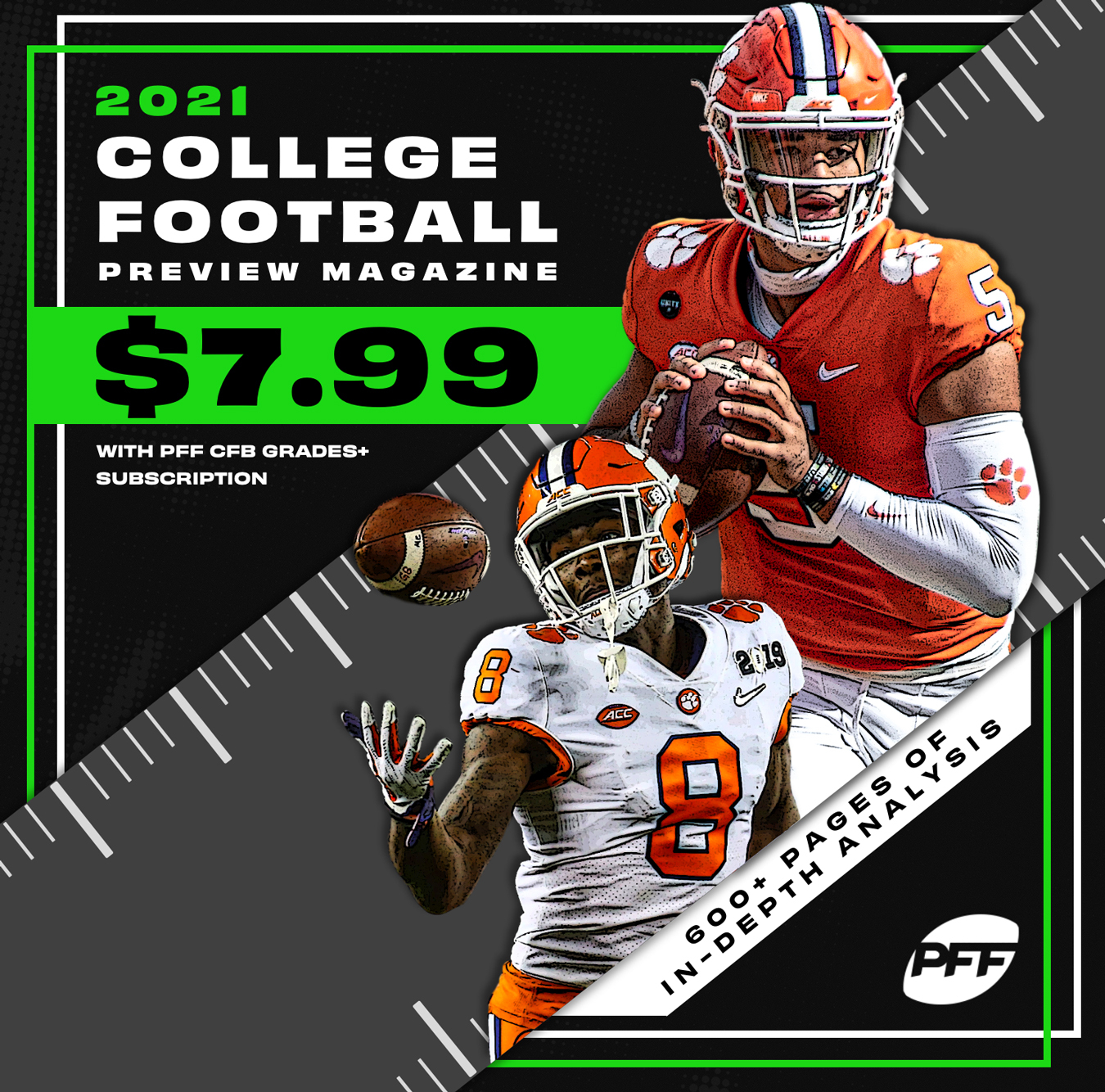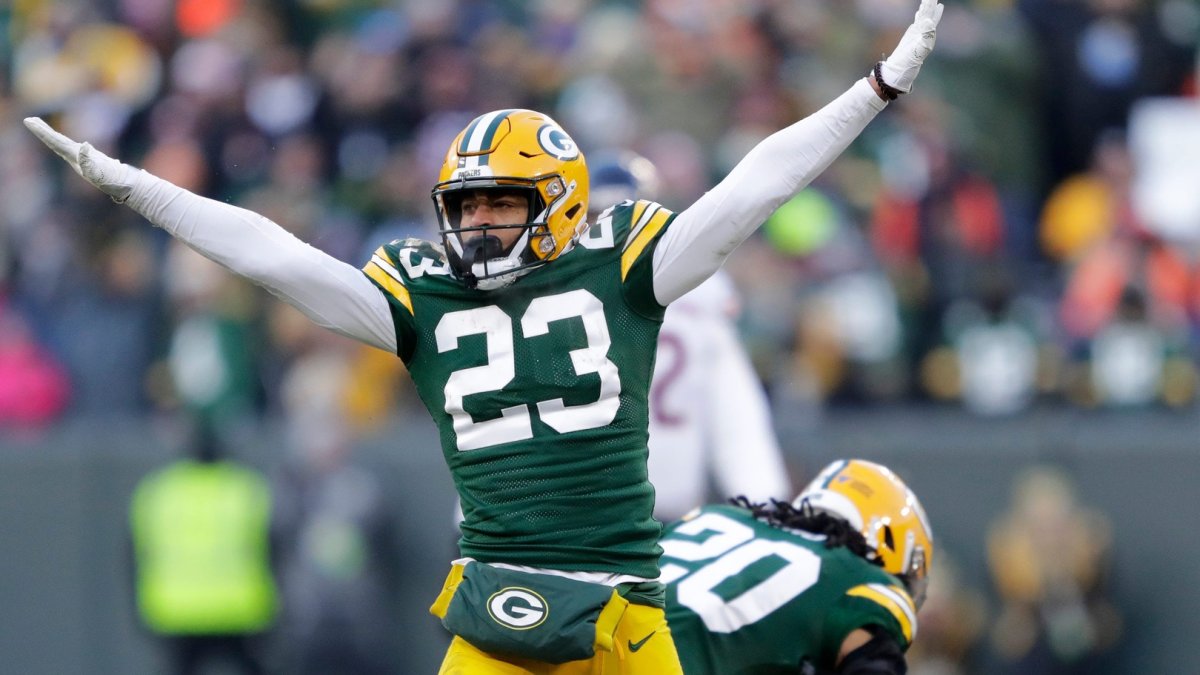Very few NFL players get better and better with every season. It may seem counterintuitive, but the learning curve isn’t always a neat line that improves every season, and just because a young player has a breakout year, it doesn’t automatically follow that the “light went on” and next season will be even better still.
The PFF data does a terrific job of showing how powerful the force of regression can be. Massive outlier seasons in either direction are likely to reverse course the following year rather than represent a fundamental change in that player’s baseline performance.
Outside of Aaron Donald — who just took the top spot on the PFF50 for the fifth consecutive year — the chance of a player posting the best PFF grade at his position year after year is slim. And though some players may end up in the same ballpark, even a slight regression will give the chasing pack of players the chance to make up the ground they may have lost the season before.
Here are five of the most obvious regression candidates ahead of the 2021 NFL season.
CB Jaire Alexander, Green Bay Packers
Alexander was the best cornerback in the NFL last season. He earned a 91.1 PFF coverage grade, including the playoffs, allowing a passer rating of just 54.3 when targeted despite the record-setting passing efficiency sweeping the NFL.
The Packers corner went toe to toe with some of the league's elite receivers yet shut down his side of the field for most of the year. But, if you go back 12 months, you can say the same thing about New England Patriots corner Stephon Gilmore, who saw his PFF coverage grade tumble from 85.7 in 2019 to just 58.5 this past year. Gilmore has age working against him, but we know cornerback play is among the most volatile in the NFL in terms of year-to-year performance because it is such a reactive position.
Jaire Alexander: PFF grade and rank in 2019 and 2020 (Rank among CBs with 300-plus coverage snaps)
| PFF Grade | 2019 | 2020 |
| Overall Grade | 73.0 (23rd) | 90.5 (1st) |
| Coverage Grade | 77.5 (12th) | 90.6 (1st) |
Alexander’s year represents a massive leap of almost 20 grading points in terms of overall PFF grade and 15 grading points when it comes to coverage grade. It coincides with the “Year 3 bump” we expect from young players, but it was such a huge leap into the rare air of elite play that we should expect regression in 2021. Alexander could lose 10 grading points next year and still be an excellent corner, but it will still represent a dip from the peak we saw a season ago.
WR Corey Davis, New York Jets
The start to his career made it difficult to remember that Davis was once the No. 4 overall pick in the NFL draft. It took until Year 4 for him to show the kind of dynamism and playmaking ability that made him such a coveted draft prospect. Still, it’s likely not a coincidence that it coincided with the league suddenly making an effort to slow down A.J. Brown after he took the league by storm as a rookie.
Davis still fell short of 1,000 receiving yards, even including the playoffs, though he did record five 100-yard games. He was one of the most efficient receivers in the NFL on a per-snap basis, averaging 2.58 yards per route run that ranked fifth league-wide.
The problem was that he was trapped within a lower-volume passing offense. An optimistic interpretation of last year was it was the season it finally all clicked for Davis, and moving to a new team like the Jets will give him even more opportunity to make plays as the No 1 threat in their offense. A pessimistic — and perhaps more realistic view — is that Davis was more of a product of Brown and the rest of the weaponry in Tennessee and that he will find it far harder to find the same kind of success this year without those other players to lean on.

G Wyatt Teller, Cleveland Browns
Teller didn’t just have a career year in 2020. He was one of the best offensive linemen in football and put on one of the best run-blocking performances we have ever seen.
The problem with projecting that forward is that it came virtually out of nowhere. Though many offensive linemen take a couple of years to find their level in the NFL, there was nothing in Teller’s tape prior to last year that suggested he was primed for a monster season. He produced a run-blocking grade of 93.6 in 2020, but the previous two seasons that mark settled at 48.2 and 54.1, moving in the wrong direction from his rookie year to his second season.
Even within those prior seasons, there were no dominant games that suggested he could iron out the inconsistency and blossom into the player we saw in 2020.
Despite offensive linemen often taking until Year 3 to play to their full potential and Kevin Stefanski bringing over a lineman-friendly system, it would make sense to expect some fall-off from Teller next season. Even if he will be a much better player going forward than he looked over his first two years, last year was so good it screams “outlier.”
C Corey Linsley, Los Angeles Chargers
Linsley has a much longer history of very good play than a lot of players on this list. The veteran lineman has played seven NFL seasons, earning a PFF grade of at least 67.7 in each of them, an above-average mark. In fact, he has never even earned anything worse than an above-average mark in any facet of play over those seven seasons, so we can be pretty confident that he will be a good player once more in 2021, even playing for a new team in the Chargers.
The 2020 season was a career year for Linsley, which earned him that big-money move in the first place, but the area that screams regression is how significant a departure it was from the rest of his career. Linsley earned a PFF grade of 86.4 last season, the best in the NFL and the only time in his career he has graded above 80.0.
He has had better seasons in pass protection, but centers actually do comparatively little pass protection in isolation compared to other positions, and his run-blocking grade was what drove the big jump in overall production. His PFF grade in that facet of play was more than 10 grading points higher than the previous season, and in only one of his other six years, had he come within that 10-point margin. Linsley will be a good player in 2021, but his chance of being the best center in the league again seems slim.
S Jessie Bates III, Cincinnati Bengals
One of the most controversial omissions from the PFF50 this year was Jessie Bates, and it’s easy to understand the displeasure. Bates was the top-graded safety in the NFL last season and the only one to post a mark higher than 90.0 overall.
If the last thing we saw was Bates earning an elite grade of 90.0-plus, why wouldn’t he rank among the best players in the game? The reason is that recency bias skews perception, and the last thing we saw isn’t necessarily the most important.
Bates was phenomenal in 2020, but that 90.1 grade was 28.9 grading points higher than the year before. It was 10.2 grading points higher than his rookie year. Play in the secondary fluctuates wildly, and while Bates was incredible, it was a grade built off a lot of plays on the football, which is a difficult thing to maintain year over year.
Bates came away with a combined 15 interceptions and pass breakups, more than any other safety despite playing much of his time as a middle-of-the-field free safety with a huge amount of ground to cover to make those plays. Bates spent 64.7% of his coverage snaps as a free safety as the single-high defender in the middle of the field and still put up those eye-popping coverage stats.
Though Bates is undoubtedly an excellent player, the league is stacked with quality safeties right now. The chances are that Bates will have a less productive season next year because the things he did well are extremely unstable.
Quarterbacks
Quarterback play always fluctuates, and the year-to-year variances change narratives completely. A season ago, Aaron Rodgers was in decline, the Green Bay Packers had just drafted his replacement and the league was preparing his eulogy. Rodgers then emerged from the abyss with the best season of his Hall of Fame career, retaking his throne as the NFL's best quarterback.
Similarly, this time last year, many people were smugly reflecting on how right they were that Josh Allen just didn’t have the skills needed to be an elite NFL quarterback. He had mustered overall PFF grades of 65.3 and 64.1 in his first two seasons and couldn’t hit a deep ball all season, ranking dead last in PFF passing grade on deep attempts with a grade of 40.7. Allen then has an All-Pro caliber season with an overall PFF grade above 90.0, taking the Bills to the AFC championship game. He generated a deep-passing grade of 93.4 and now looks like the best young passer in the game.
The reverse is also true. Lamar Jackson went from unanimous MVP in 2019 to a player who ranked 16th in PFF passing grade and 15th overall the following year. His touchdown percentage went from a league-leading 8.0% to 6.1% — still good, but a significant regression.
Allen and Rodgers are the two most obvious regression candidates at the quarterback position for the 2021 season. Both players are coming off career years, and some kind of step in the wrong direction should be expected, even if it changes the narrative on those players.



 © 2024 PFF - all rights reserved.
© 2024 PFF - all rights reserved.